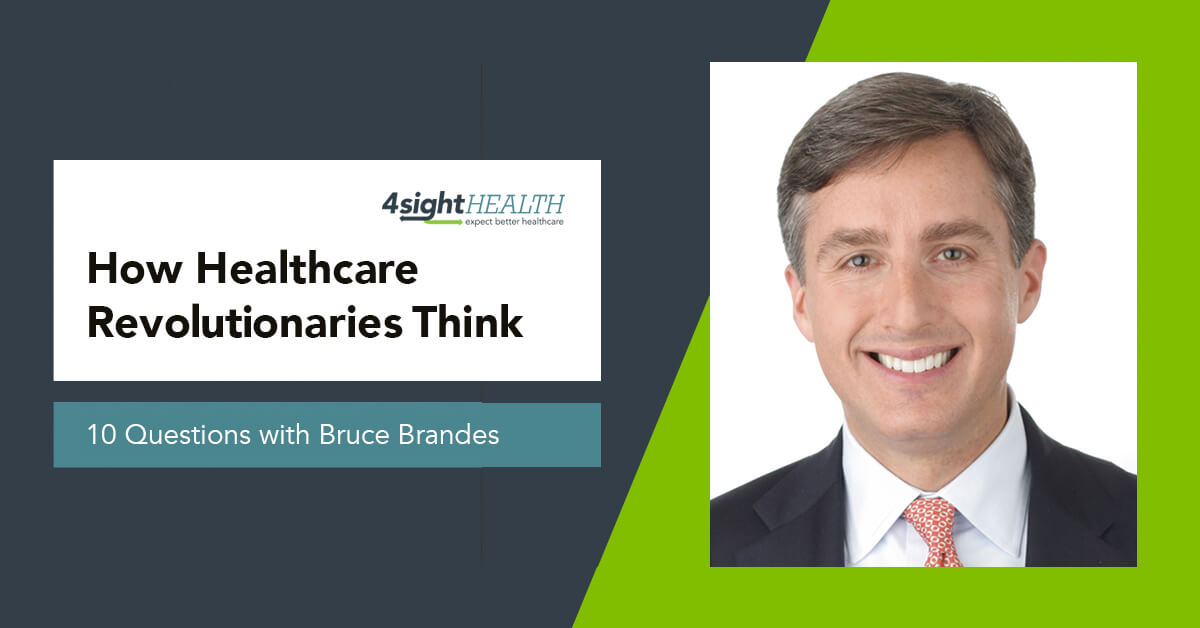December 15, 2022

How Healthcare Revolutionaries Think: 10 Questions with Bruce Brandes
Welcome to the latest installment of 4sight Health’s series, How Healthcare Revolutionaries Think. Our interview series profiles healthcare instigators who believe that outcomes matter, customers count and value rules.
Washington had his Hamilton. Sherlock had his Watson. And Carson had his McMahon. Healthcare has its Brandes. That’s Bruce Brandes, president of care.ai. Care.ai is an Orlando, Fla.-based technology firm that’s designed an AI-powered, “ambient” software platform for hospitals and nursing homes that does everything from monitoring patients to optimizing the workforce. Crescent Cove Advisors last month invested $27 million in care.ai to help the company scale its creation.
Brandes joined care.ai in July 2022 after stops at a number of notable disruptive healthcare companies and organizations, including Teladoc, Livongo, AVIA and AirStrip. He acknowledges that he doesn’t come up with the idea, but it’s his job to advance the idea in the industry to make the healthcare system work better for patients.
Brandes describes himself as more of an aide-de-camp than a healthcare revolutionary. I recently had the opportunity to interview Brandes and ask him what a healthcare aide-de-camp does.
Listen to the related podcast here.
1. Bruce, let’s start with the question I ask everyone, and that’s your definition of a healthcare revolutionary. What are their character or personality traits?
Brandes: A healthcare revolutionary is someone who is clearly a catalyst for transformational change to improve everyone’s health, provide better quality, better access, and do it at a lower cost. A healthcare revolutionary also is an innovator who recognizes that change in healthcare is not going to be as abrupt a disruption like we’ve experienced in other industries. If we’re going to revolutionize healthcare, it’s going to come through a series of accelerated and focused areas for transformative evolution, not one big disruptive revolution.
Because of that, a healthcare revolutionary must have a deep understanding of how healthcare works, why it works the way it does — and has for the last 50 years. They also must not be constrained or conflicted by legacy interests. They have to feel free to challenge the status quo because there are a lot of forces working against those types of changes.
2. When you compare the healthcare industry with other industries, what’s the difference that makes other industries able to flip overnight and healthcare not so much?
Brandes: There are a couple of reasons, starting with the human element. We’re talking about life and death. When we explain disrupting retail or banking, it’s not immediately consequential as to whether someone lives or dies. If Amazon disrupts shopping malls, most people don’t care too much if a physical store goes out of business. But you know what? I do care deeply if my local hospital goes away. When we re-imagine healthcare’s future state, we have to keep in mind that we have an obligation to help people become healthier and serve them when they’re in need.
The other thing that makes healthcare different from other industries and unable to change overnight is how the economics work. The underlying business of healthcare makes it extremely challenging for consumers to make decisions and act with normal consumer-like behaviors. Money doesn’t flow the same way that it does in other industries, which is a straight line between buyer and seller. In healthcare, that line is anything but straight.
3. The stakes are much higher, and the economics are much more complicated. I get it. Given your definition of a healthcare revolutionary and the steep hill they have to climb, who is your favorite healthcare revolutionary, past or present, and why?
Brandes: I’ve been fortunate over my career to work with healthcare innovators whom I believe are revolutionary and from whom I’ve drawn motivation and wisdom. I’d say none more so than legendary Nashville health services pioneer Charlie Martin. And for anyone who knows Charlie, they’d agree that if Lin-Manuel Miranda wrote a Broadway musical about the healthcare revolution years from now, Charlie would 100 percent be a leading character. He’s just a remarkable person, who over his 50-year career successfully built several investor-owned hospital systems within the existing clinical and economic models of healthcare.
As Charlie started to see the need for change, he tried to spark that change from within the constraints of the existing system. Then he realized that inspiring new models of delivering and funding a healthcare system rather than a sick-care system, meant he needed to exit the hospital business. No one was better positioned than Charlie to lead the revolution from within, but he also realized he couldn’t do it while substantially tied to legacy interests. He also recognized how change can’t be achieved individually, no matter how well-funded or knowledgeable or motivated you are. It really requires an aligned group of revolutionaries.
4. It does say something about healthcare when there’s a limit to how far you can go to fix things from within the system. It’s like those invisible electric fences that stop charging dogs from running out of their yards. If you go too far, you get zapped and learn not to cross the line.
Brandes: I think so. Some of the smartest people in our industry — the ones who are really pushing the envelope — are running into that invisible fence. That’s why you’re seeing many healthcare luminaries bursting through that fence and banding together through venture capital firms like General Catalyst to do what they couldn’t do running big health systems.
5. Are you a healthcare revolutionary?
Brandes: I appreciate the question, but when I think about real revolutionaries like Charlie, I see myself as more of an aide-de-camp to those people. Most of my career has been coming in alongside or behind a founder after they’ve built a solution or proven a concept but needed to figure out how to achieve scale. I love being on the leading edge of things, but I’m definitely more measured in how, when and where I take risks.
6. I’m not sure you’ll appreciate this potentially sensitive question, but by my count, you’ve had 11 jobs in a little more than 33 years. That’s an average of about three years per company. What’s up? Do you get bored easily? Do you get impatient? Do you run into that invisible fence?
Brandes: You sound like my mother. When I started my career at IBM in 1989, I joined everyone else there at the time in thinking I’d work there for 30 or 40 years, get my gold watch and retire. I joined IBM straight out of business school, and I was fortunate to get assigned to the healthcare industry vertical. IBM went into depth explaining how the business of healthcare worked, and I remember thinking how nonsensical the entire thing was. I naively puffed out my chest and said, “But I work for IBM! Technology will fix it all.” I was wrong. And I also realized that I was a little more entrepreneurial than you could be at IBM.
Yes, I have worked for a bunch of different companies. But I see my entire career as one job with different steps all tied to the singular purpose of my professional journey — which is advancing information technology to help doctors and nurses save peoples’ lives. Each step in my career has been about searching for another piece to add toward solving that puzzle. Generally, it takes me three or four years to do what I have been brought on to do with any one specific company. Or, in a couple of cases, I realized in the first year that it was going to fail fast, and it was time to move on. Either way, I always found another piece of the puzzle to transform healthcare.
7. You said IBM assigned you to healthcare. Was that just dumb luck, fate or did you asked to work in IBM’s healthcare vertical?
Brandes: It was completely arbitrary. I joined IBM as a marketing rep, which was a softer word for sales. I was blessed to get assigned to healthcare. I found motivation in that because I was helping hospitals and caregivers save lives. I couldn’t find that same motivation if I was selling to banking or retail or the government. I would not have been successful if they put me in any of those other industries. I couldn’t be passionate about it. IBM’s random assignment 33 years ago set me off on a quest that’s been my whole career.
8. When you think about healthcare then and you think about healthcare now, what’s changed and what hasn’t changed in terms of culture and the ability to affect change?
Brandes: I believe our current healthcare system is perfectly optimized. When I say that, everyone rolls their eyes and says, “What the hell are you talking about?” Unfortunately, it’s true. This industry has been iteratively optimized over the past 50+ years based on economic incentives and clinical priorities constructed in the 1960s. As a result, today we spend more than $4 trillion a year on healthcare in the U.S. and arguably half of that is totally wasted on bureaucracy, inefficiencies, or activities that are not clinically necessary. When you think about the opportunity to change that, you have to remember that every one of those dollars wasted or spent inefficiently is someone’s revenue, which they are reluctant to give up. Those organizations today spend about three quarters of a billion dollars a year on lobbyists to make sure that there’s no real healthcare revolution. Maybe just a few tweaks around the edges. That’s the reality we face and why healthcare has been slow to change.
That said, I’m encouraged by the remarkably smart and ambitious industry outsiders that have come in and are focusing on the big problems in healthcare. Today is different because of all the advancements in technology, consumer and cultural expectations, and frankly, just the overwhelming economics that really make transformation both necessary and possible today in ways that really were never possible in the past.
9. Earlier you described yourself as the aide-de-camp to the person with the big idea. To paraphrase Liam Neeson’s character in Taken, do you have a particular set of skills that you’ve acquired over a long career that make you a nightmare for healthcare incumbents?
Brandes: Healthcare is hard. It’s complex. I believe I have a strength of being able to listen and understand the industry well and to sift through all of the different potential solutions that are out there. I think my gift is to then simplify it, translate and explain it in ducky-horsey-doggy terms. Because until you can take these complicated topics and discuss them in a way so everyone can “get it,” you won’t be able to act on them or be a catalyst or slingshot for something to work at scale.
10. When you’re not using your gift to make healthcare better for consumers, which I’m sure is a nearly 24/7 endeavor, what are you doing?
Brandes: I’m a history geek. I recently took a trip of a lifetime through Central and Eastern Europe with my wife and a couple of dear friends. What I loved most was seeing history up close – everything from the fall of the Roman Empire through the fall of the Berlin Wall. Seeing how much of history has repeated itself reminded me how so many of the lessons learned through history are directly relevant to what we’re experiencing today as a society here in the U.S. I love thinking about how to extrapolate how those lessons can actually apply to the work we’re doing in healthcare. I’m very fortunate to love what I’m doing.
Burda’s Final Bit
Like Bruce, I’ve been very fortunate to work with a lot of really smart people — much smarter than me — during my nearly 40 years as a healthcare reporter, editor and writer. Interestingly, the smartest people I’ve worked with all have the same problem: execution. They have a great idea but can’t pull the trigger. I used to tell one incredibly smart reporter I worked with, “You know what the secret to publishing is? Publishing. If you know something, why don’t you tell our readers. Don’t walk around the newsroom telling us what you know.” If we’re going to fix healthcare for everyone, particularly patients and clinicians, we’re going to need people like Bruce. It’s all in the execution.
Read More Interviews with Healthcare Revolutionaries
- November 2022: Lena Chaihorsky
- July 2022: David Nash, M.D.
- June 2022: Esther Dyson
- April 2022: Meghan Conroy
- March 2022: Adrianne Nickerson
- February 2022: David Snow
- January 2022: Kristen Valdes
- October 2021: Glen Tullman
- September 2021: David Greenberg and Dave Jacobs
- August 2021: Jeff Jones
- July 2021: Scott Powder
- June 2021: Robert Pearl, M.D.
- May 2021: Kurt Waltenbaugh
- April 2021: Jon Pearce
- March 2021: Thompson Aderinkomi
- February 2021: Gaurov Dayal, M.D.
Bruce Brandes has over 30 years of experience in executive management and entrepreneurial thought leadership to build growth stage technology-based businesses in the healthcare industry. Supported by a trusted network earned over his career, Bruce’s strengths range as a strategist, operator, entrepreneur, investor, fund-raiser and marketer to advance the transformational promise of digital health.
The healthcare innovations to which Bruce has made meaningful contributions include:
- developing smart care facilities, leveraging ambient intelligence and virtual nursing
- scaling consumer and provider adoption of virtual care
- creating a platform to reinvent the connection between buyers and sellers of digital health solutions
- accelerating the shift toward value-based care
- helping pioneer and scale the widespread adoption of remote patient monitoring following the introduction of the iPhone
- driving early market acceptance of electronic medical records in the 1990s
A career-long member of ACHE, Bruce currently serves on the Board of Advisors at several innovative companies and mentors future leaders as Entrepreneur in Residence at the University of Florida’s Warrington College of Business.





